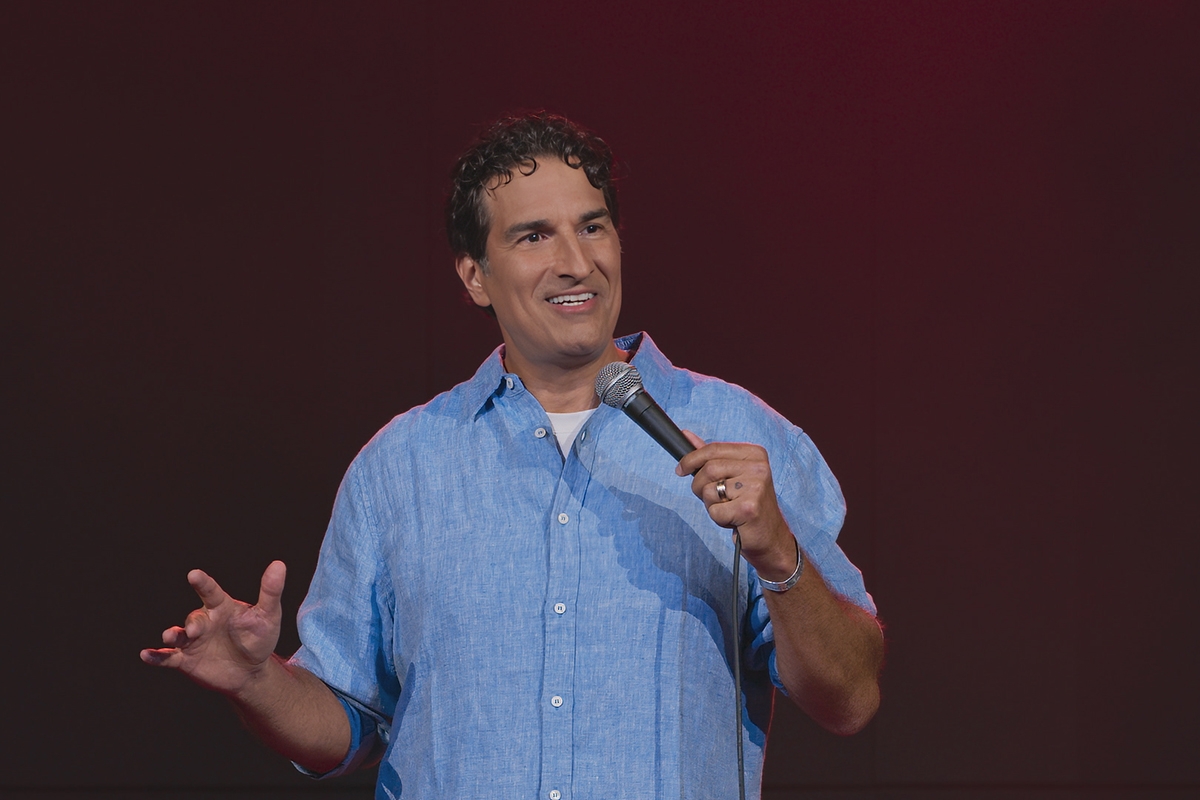In the middle of his new Max comedy special, “Born on 3rd Base,” Gary Gulman takes a break during an anecdote about a Passover seder to write an imaginary critique of his show.
“Gulman got really Jewy,” he pretends to type up. “I thought his base was librarians,” the imaginary critic laments, but it turns out “it’s middle-aged Jews.”
There’s some truth to that — Gulman’s newest special is possibly his Jewiest yet (I wonder what he would think of that word, as he spends so much of the special pontificating on language) — but he has always flavored his work with excellent Jewish humor, including this funny and insightful rant about antisemitism that has recently been widely shared. Still, as a real, not imagined critic, I can say this special very much leans into the Jewishness of it all, even begging us to lean into our own Judaism, too.
“In an attempt to assimilate, I’ve noticed a lot of Jewish people push back on the ‘ch,'” he says in the special, referring to the throaty sound of the Hebrew letter chet, and how many Americans don’t use it when saying words like “challah” and “rugelach.”
“Embrace the chhhhh,” he urges his fellow Jews. “What are they gonna do, hate us?”
Gulman frames his childhood growing up on welfare Jewishly as well. “I grew up in an oft-ignored sector of Jewish people called poor,” he says to erupting laughter. He later calls that laughter into question while reminding viewers about the kind of preconceptions we may have about Jews in this country and beyond.
Yet to say that Gulman is a comedian for librarians or middle-aged Jews alone is selling him short (which, contrary to stereotypes about Jews, he isn’t. He’s also an excellent basketball player). Sure, his Jewish jokes are excellent in their specificity; the way he plays with language is sharp and unique; and his rants against pompous suffixes like “esque” while also using the word “moribund,” on top of his literary references to the likes of O. Henry and Dickens, are delightful.
Yet Gulman is more than a quaint niche comedian. He explains in the special that he can’t watch close-up magic tricks, but he himself is a kind of magician, imbuing everyday objects and interactions with new meaning by examining them with a delightfully humorous sharpness.
A Pop Tart, a discount code from Banana Republic, a metal straw, a pipe cleaner was — all objects you’d be bored to hear someone drawl on about for minutes in casual conversation take on a life of their own in Gulman’s comedy, a source of wonder, of social commentary. An angry costumer in Chipotle, a card trick, and even the very show you’re watching suddenly become much more.
Gulman isn’t a particularly didactic comedian but, as he told Kveller last year, he does care about making people feel seen, and he does see art as a sort of tikkun olam, healing the world. If his 2019 special “The Great Depresh” shed a light on the experience of people with mental illness, “Born on 3rd Base” makes incisive observations about the myths we have about poverty in this country. He talks about the kind of loops he was made to jump through to get free breakfast at school, the difficult math he needed to understand from a young age in order to survive, the kind of stigma that comes from being poor and the selfish excuses people make while cutting funds for welfare.
Amid all the jokes, Gulman makes one thing abundantly clear: “Welfare saved my life,” he says.
He also talks about the things that didn’t make him feel poor — more that anything, his Jewish father, Phil Gulman, who he defines as “a mensch.”
“He left us with incredible values,” he tells the crowd.
Those kinds of generous values are there in Gulman’s menschy comedy. He talks about how the experience of poverty gives you a great amount of empathy and kindness, a desire to bring other people up. He actually interrupts his show for an aside to thank the crowd for their laughter and engagement. He talks about opening every show with a prayer of gratitude. He’s also very open about his flaws, as a person and a comedian, but its shedding the light on those vulnerabilities that makes his comedy so endearing. His terrible miming becomes one of the most enjoyable jokes in the show.
By the end of the special, every interruption and non-sequitur gets tied up neatly, in a way that seems effortless and masterful. Gulman’s comedy is truly for everyone, something you’ll want to revisit again and again. It’s a treat that you relish, like a perfectly baked rugelachhhh.








